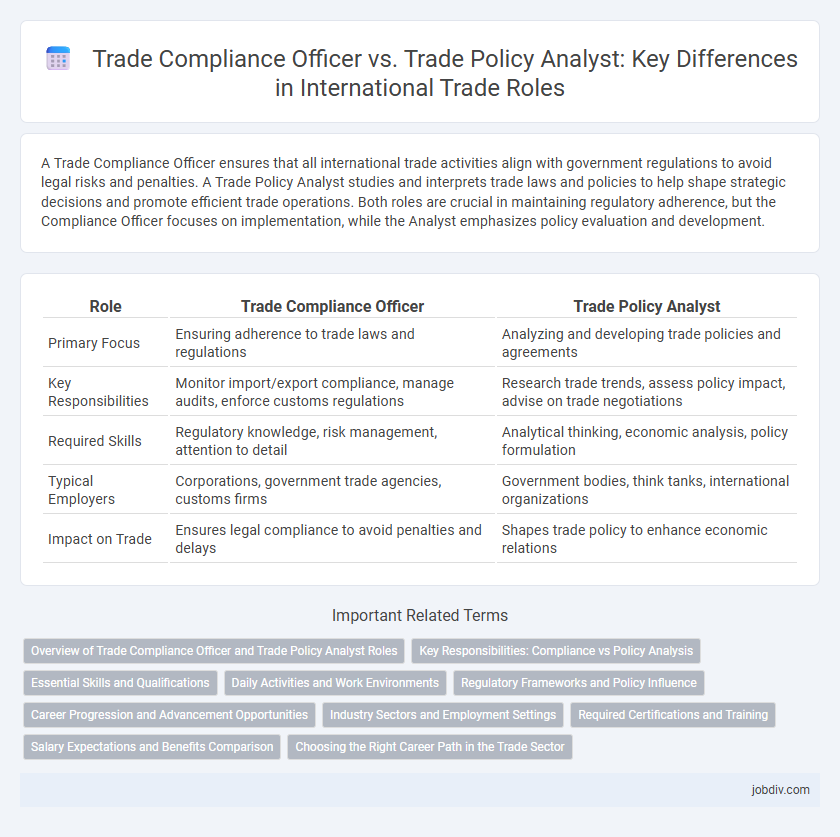A Trade Compliance Officer ensures that all international trade activities align with government regulations to avoid legal risks and penalties. A Trade Policy Analyst studies and interprets trade laws and policies to help shape strategic decisions and promote efficient trade operations. Both roles are crucial in maintaining regulatory adherence, but the Compliance Officer focuses on implementation, while the Analyst emphasizes policy evaluation and development.
Table of Comparison
| Role | Trade Compliance Officer | Trade Policy Analyst |
|---|---|---|
| Primary Focus | Ensuring adherence to trade laws and regulations | Analyzing and developing trade policies and agreements |
| Key Responsibilities | Monitor import/export compliance, manage audits, enforce customs regulations | Research trade trends, assess policy impact, advise on trade negotiations |
| Required Skills | Regulatory knowledge, risk management, attention to detail | Analytical thinking, economic analysis, policy formulation |
| Typical Employers | Corporations, government trade agencies, customs firms | Government bodies, think tanks, international organizations |
| Impact on Trade | Ensures legal compliance to avoid penalties and delays | Shapes trade policy to enhance economic relations |
Overview of Trade Compliance Officer and Trade Policy Analyst Roles
Trade Compliance Officers ensure companies adhere to international trade laws and regulations, overseeing import/export documentation and conducting audits to prevent legal violations. Trade Policy Analysts evaluate and interpret trade policies, providing strategic insights to influence government trade decisions and support corporate planning. Both roles are critical in managing risks and optimizing compliance within global trade operations.
Key Responsibilities: Compliance vs Policy Analysis
Trade Compliance Officers ensure adherence to international trade regulations by monitoring shipments, verifying documentation, and conducting risk assessments to prevent violations and penalties. Trade Policy Analysts focus on evaluating trade agreements, analyzing regulatory changes, and providing strategic recommendations to align corporate policies with evolving global trade laws. Both roles require deep knowledge of trade laws, but Compliance Officers primarily manage day-to-day regulatory enforcement while Policy Analysts drive policy development and impact assessment.
Essential Skills and Qualifications
Trade Compliance Officers require expertise in regulatory frameworks, risk assessment, and customs procedures to ensure adherence to international trade laws and company policies. Trade Policy Analysts must possess strong analytical skills, proficiency in economic data interpretation, and policy evaluation to assess trade agreements and their impact on markets. Both roles demand excellent communication skills, attention to detail, and knowledge of global trade regulations, but the Compliance Officer focuses more on enforcement while the Analyst concentrates on policy development.
Daily Activities and Work Environments
Trade Compliance Officers monitor and enforce adherence to international trade regulations by conducting audits, managing import/export documentation, and liaising with customs authorities to prevent violations. Trade Policy Analysts research and analyze trade laws, prepare policy recommendations, and evaluate the impact of trade agreements within government agencies or think tanks. While Compliance Officers often work in corporate or logistics environments with a focus on operational execution, Policy Analysts typically operate in office settings dedicated to strategic planning and legislative support.
Regulatory Frameworks and Policy Influence
Trade Compliance Officers ensure adherence to international trade laws, customs regulations, and import-export controls, safeguarding companies from legal risks and penalties. Trade Policy Analysts evaluate and influence trade policies by analyzing regulatory frameworks, economic impacts, and political trends, providing actionable insights for government agencies or corporations. Both roles demand expertise in trade regulations, but Compliance Officers focus on implementation and enforcement, while Policy Analysts concentrate on shaping and interpreting trade policy.
Career Progression and Advancement Opportunities
Trade Compliance Officers often advance by gaining expertise in regulatory frameworks and risk management, leading to senior compliance or audit leadership roles. Trade Policy Analysts typically progress by deepening their understanding of international trade laws and economic policies, opening pathways to advisory positions or governmental strategy roles. Both careers benefit from certifications like CTPAT or CIPP, which enhance prospects for higher-level responsibilities and cross-functional leadership in global trade operations.
Industry Sectors and Employment Settings
Trade Compliance Officers primarily work in manufacturing, logistics, and retail sectors, ensuring companies adhere to international trade regulations and customs laws. Trade Policy Analysts are commonly employed in government agencies, think tanks, and consultancy firms, focusing on the development and evaluation of trade policies affecting multiple industries. While Compliance Officers handle operational enforcement within private companies, Policy Analysts influence trade strategy and regulatory frameworks across public and private sectors.
Required Certifications and Training
Trade Compliance Officers typically require certifications such as Certified Customs Specialist (CCS) or Certified Export Compliance Officer (CECO) to ensure adherence to international trade laws and regulations. Trade Policy Analysts benefit from advanced training in international economics, policy analysis, and certifications like Certified Trade Policy Analyst (CTPA) to effectively evaluate and develop trade policies. Both roles demand continuous education in global trade regulations, but the Compliance Officer focuses more on regulatory certifications while the Policy Analyst emphasizes analytical and policy-oriented training.
Salary Expectations and Benefits Comparison
Trade Compliance Officers typically earn between $60,000 and $90,000 annually, with benefits including health insurance, retirement plans, and performance bonuses. Trade Policy Analysts often command higher salaries ranging from $70,000 to $110,000, reflecting their strategic role in shaping trade regulations, with benefits such as professional development funds and flexible work arrangements. Salary and benefits for both roles vary by industry, experience level, and geographic location, impacting overall compensation packages.
Choosing the Right Career Path in the Trade Sector
Trade Compliance Officers ensure companies adhere to international trade laws and regulations, focusing on risk management and regulatory enforcement. Trade Policy Analysts research and interpret trade policies, advising governments or businesses on economic impacts and strategy development. Choosing between these careers depends on whether you prefer regulatory enforcement and compliance or policy research and strategic analysis within the trade sector.
Trade Compliance Officer vs Trade Policy Analyst Infographic

 jobdiv.com
jobdiv.com